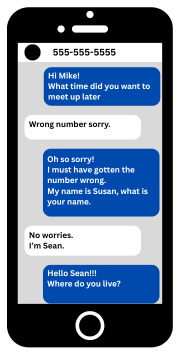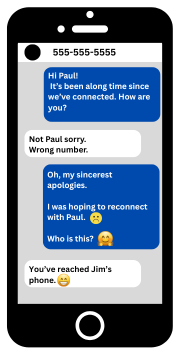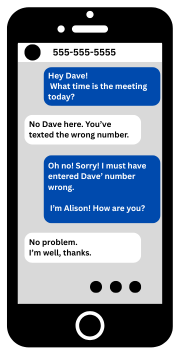Submitted by nsscadmin on

Have you ever received a text message from a wrong number? If the answer is no, you’re one of the very few people that can say that. A more appropriate question may be how often do you receive wrong number texts? There are people in our office that get them on a weekly basis, and some more frequently than that.
There’s a good chance these wrong number texts are attempts to target you with a pig butchering scam. Over the last five years pig butchering scams have stolen millions of dollars from Nova Scotians, and according to the FBI, billions worldwide.
If you receive a text message that appears to be sent to the wrong number, your best response is to provide none at all. Delete the message and block the number it came from.
Here’s what some of those messages might look like:




If you do engage with the person sending you the message they will try to develop a friendly relationship with you. They may also try to get you to move the conversation to a social media app like WhatsApp, or Telegram.
If they are successful in developing a relationship with you, they could become what you consider to be a close friend, bonding with you about similar interests and experiences, and messaging back and forth several times a day.
After gaining your trust over what may be weeks or month your new friend will tell you about a great investment they have recently made that has made them a lot of money. This investment will likely be connected to some types of crypto asset and/or crypto asset trading platform. They will try to persuade you to invest as well hitting on points like, “you could use extra income,” “ the cost of living is so high,” “little to no risk,” and “quick and easy money.” They may also try to talk you into investing a small amount of money initially, around $100 or $200 to get started, as losing that much money wouldn’t be a big deal.
If you do decide to invest, your friend will send you a link to an online platform or a link to download a trading app to your computer or mobile device. They will meticulously walk you through the steps to deposit money onto the trading platform and purchase some crypto assets.
Not long after their initial investment has been made, you will receive an account statement, or alert that your account balance has grown considerably. For example, your $100 investment has increased to $1,500 in a few days. Your friend will be very happy for you and try to talk you into investing more money in the platform. “Your $100 is now worth $1,500! Think if you had invested $1,000 or $10,000. You’d be on your way to being a millionaire!” If you don’t have available funds to invest your friend will suggest taking out a line of credit, maxing out credit card cash advances, or borrowing from friends and family to invest. There have been investors in Nova Scotia and around the world that have done so and invested more than six figures into these fraudulent investments.
The catch is that there is no investment. Everything is fake. Your new friend is using a fake name and contacting hundreds of people around the world trying to steal their money. They may even be a victim themselves, kidnapped and human-trafficked into being forced to con unsuspecting people. The relationship is based on lies. The platform is fraudulent as is the investment and the huge growth numbers being shown.
As you deposit more money onto the platform to invest, you may continue to see your account grow rapidly. For example, we have seen victims who have deposited $40,000 be shown account balances in excess of $3 million.
Eventually, you may want to withdraw some of your investment returns. You may put a withdrawal request into the platform and be told you must pay taxes or fees to process the withdrawal. These are also fraudulent. Even if the taxes and fees are paid the withdrawal will not be processed. At this time, you will likely be cut off from the platform, losing all access to your deposited funds. Your friend will stop communicating with you, never to be heard from again.
Pig butchering scams are a world-wide epidemic that have been responsible for huge losses in Nova Scotia and around the world over the last several years. Billions of dollars have been lost, and in many cases the financial harm is dire as not only are investors out their money, many have also taken on massive amounts of debt which they now owe with high interest.
If you receive what appears to be a wrong number text, or unsolicited messages through messaging apps, or social media platforms, do not reply. Delete the messages and block the person from contacting your further. If you or a friend or family member is a victim of pig butcher, please report it to law enforcement and your local securities regulator.
